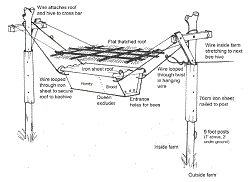 |
Farmers, Elephants, and Bees:
A Winning Combination
As if African elephants didn�t have enough to worry about, habitat loss is yet another key issue affecting their survival. Although elephant populations have increased since the 1970s, the human population has grown even more quickly, cutting the elephants� habitat up into farms and roads. The elephants� key migratory routes have been cut off in many places. As result, they regularly break through fences, where they eat and destroy crops. When the farmers confront elephants on their property, things don�t generally end well for either party.

Lucy King, a researcher working with Save the Elephants, has spent many years investigating the problems involved in crop protection. Her goal is to find long-term solutions that reduce the frequency of human-elephant conflicts�and that can be financed and managed by local farmers.
As Ms. King looked into the elephants� habits for any clues to keeping them out of fields planted with crops, she noticed that they tended to avoid acacia trees with active nests of African bees. Elephants, it so happens, are afraid of the bees, and will move away from an area and warn other elephants if they hear bees buzzing nearby.
And so the beehive fence was invented. The fences are simple, inexpensive, and easy for the farmers to build and maintain. The thatched roof over the hives keeps the bees dry in the rain and keeps them from getting overheated in the sun (they get aggressive and eventually leave the hives if they get too hot). The hives are hung at chest height which makes it easy for the farmer to harvest the honey, while also making them highly visible to the elephants.

The hives, connected by wires, are hung every 10 meters around the perimeter of a field. The farmers leave wide pathways between their crops so elephants can move past the fences along their migratory routes. If an elephant makes contact with one of the hives or the connecting wires, the beehives all along the fence will swing and release the bees.
This approach has proven to be extremely effective, reducing crop destruction and human-elephant conflicts by up to 85%. And, according to Lucy King, there�s an added bonus: Elephant-friendly honey from beehive fences provides additional income for the farmers.
�Not only do low-income farmers benefit from higher yields through reduced damaging crop-raids, but they also benefit from honey production and sales. This diversifies both their income and their food-production options as honey is financially valuable, nutritious and does not require refrigeration.�

This is the kind of solution we need more of�easy to implement and manage by local communities, with immediate and long-term benefits. And we�re not the only ones who think so. Lucy King won a 2013 Future for Nature award, and the Elephants and Bees project has been awarded the St. Andrews Prize for the Environment.
Edie Freedman, "Farmers, Elephants, and Bees: A Winning Combination," http://animals.oreilly.com/elephants-and-bees/, May 6, 2013
To learn more about GHA and how your property can be greener, jump to
Green Hotels Association!
or CALL 713/789-8889 TODAY!
|

GREEN IDEA!
 A Florida hotel bought a mulcher to chop up their garden clippings and create their own mulch. The mulcher paid for itself in three months.
A Florida hotel bought a mulcher to chop up their garden clippings and create their own mulch. The mulcher paid for itself in three months.







greenhotels.com
|
|
Unique Visitors |
Hits |
| Jan |
8,223 |
378,113 |
| Feb |
8,124 |
378,460 |
| Mar |
9,904 |
451,836 |
| Apr |
10,639 |
464,092 |
| May |
9,848 |
416,078 |
| Jun |
11,776 |
373,910 |
| TOTAL 2014 |
58,514 |
2,462,489 |

|
 |



